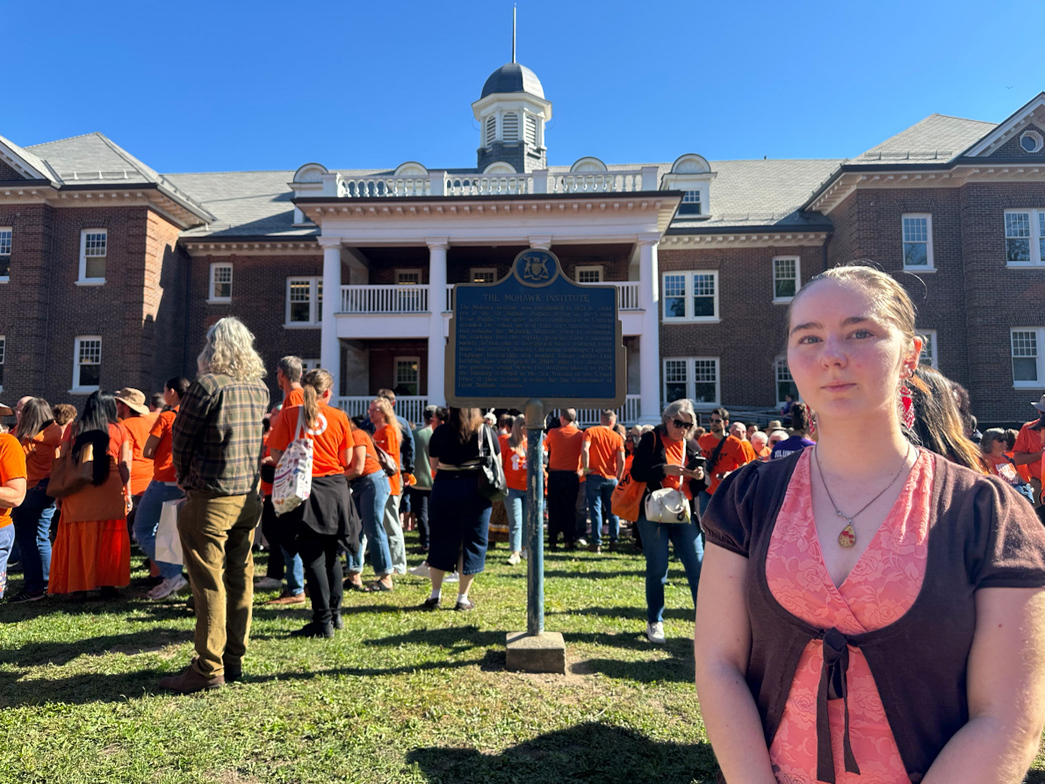
Heather Wilks Jenkins of the Alongside Hope Youth Council stands in front of the former Mohawk Institute, the longest-running residential school in Canada and now a part of the Woodland Cultural Centre
On September 30th, the doors of the former Mohawk Institute Residential School in Brantford, Ontario opened once more; this time as a museum for truth-telling. Now part of the Woodland Cultural Centre, the reopening took place on the National Day for Truth and Reconciliation. The event drew hundreds to honour survivors and confront the legacy of Canada’s longest-operating residential school.
Inside the Centre, exhibits of Indigenous language, art, history, and testimony offer a powerful invitation to listen and learn. These expressions of identity which were once suppressed through policies of forced assimilation now speak with clarity and strength.
The Anglican Church of Canada held spiritual and administrative control in partnership with the Federal Government over the Mohawk Institute from its founding by an Anglican society in 1828, until 1970. The Church continues its journey of repentance and accountability, guided by the truths shared by survivors and the leadership of Indigenous communities. From Archbishop Michael Peers’ 1993 apology to the National Native Convocation (now the Sacred Circle), to Archbishop Fred Hiltz’s 2019 apology for spiritual harm, and Archbishop of Canterbury Justin Welby’s 2022 visit and apology to Indigenous communities, the Church has committed to walking alongside survivors in humility and ongoing response.
In his 1993 address as Primate of the Anglican Church of Canada, Archbishop Michael Peers offered this formal apology to Indigenous peoples for the Church’s role in the residential school system:
“I am sorry, more than I can say, that we were part of a system that took you and your children from home and family. I am sorry, more than I can say, that we tried to remake you in our image. I am sorry, more than I can say, that in our schools so many were abused physically, sexually, culturally, and emotionally ... I accept and I confess before God and you, our failures in the residential schools. We failed you. We failed ourselves. We failed God.”
Such words matter deeply, but on their own they do not undo the harm. Instead, they call the Church into an ongoing commitment that honours the courage of survivors, affirms Indigenous leadership, and seeks healing through sustained listening, tangible action, and structural change. Guided by the truths shared and the leadership offered by Indigenous communities, this journey must be lived out in relationship.
In response to this call, Alongside Hope has sought to walk humbly and respectfully alongside Indigenous-led programming across Canada. These initiatives focus on language and artifact reclamation, community health, youth engagement, safe water, and climate action. They are rooted in Indigenous leadership and shaped through collaboration that begins with listening, humility, and respect.
The Alongside Hope Youth Council was invited to participate in Sacred Beginnings, a gathering of Indigenous youth, elders, and Knowledge Keepers. Through intergenerational learning, it is a space where memory is honoured, futures are imagined, and the work of repair continues - not as a project, but as a shared path. As Heather Wilks Jenkins reflected: “Sacred Beginnings has been an experience of listening in a deeper way and being present with respect, so the stories and relationships can shape how we move forward together.”
